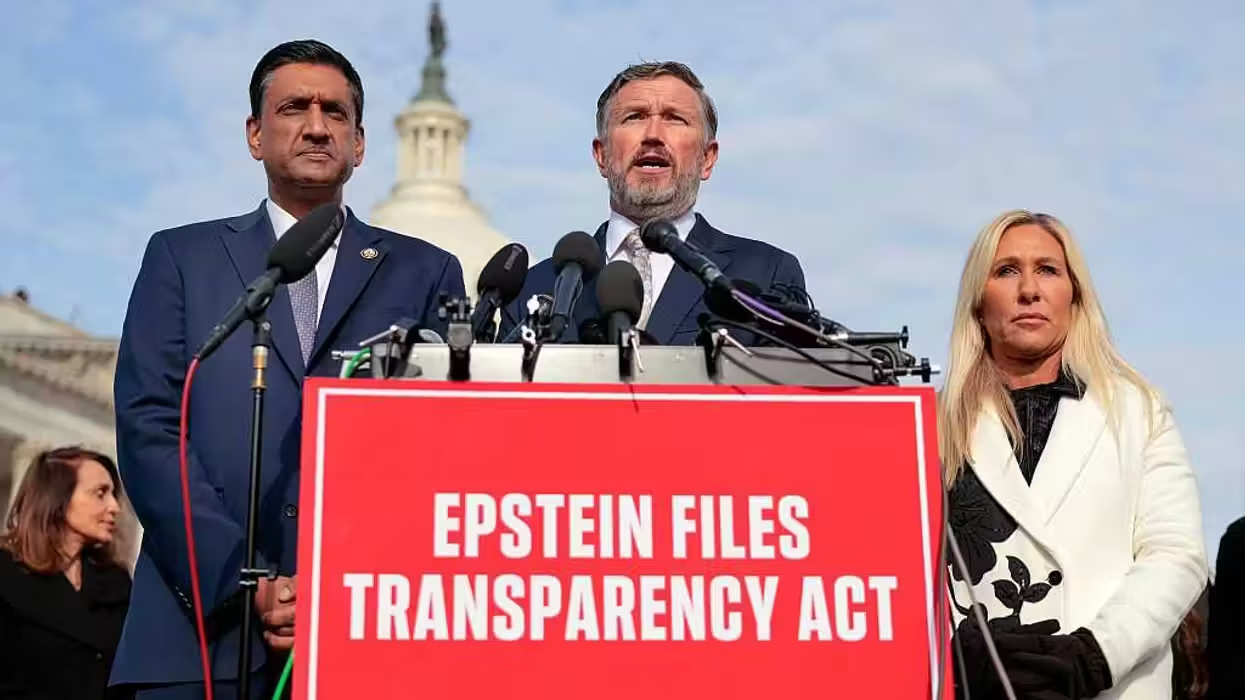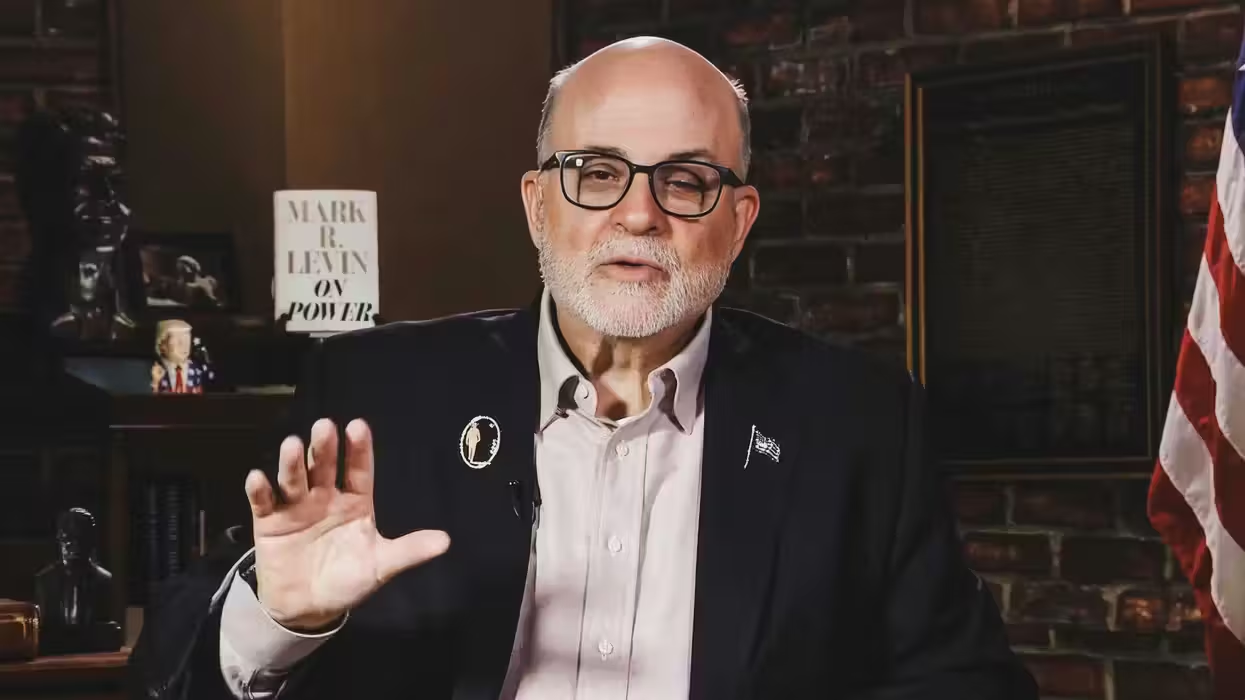
© 2025 Blaze Media LLC. All rights reserved.
Foster Dad Breaks Down the Latest in His Battle to Bring Back the 6-Year-Old Girl Who Was Seized From His Home Over Her Native American Heritage
April 12, 2016
"I've been given a gag order."
A foster family that lost custody of a 6-year-old girl due to the 1978 Indian Child Welfare Act — a federal law mandating that “Indian children” be raised by Native Americans — isn't backing down.
Foster dad Rusty Page told The Church Boys podcast on Monday that he and his wife, Summer, are continuing to pursue legal appeals in an effort to try and bring Lexi, who is one-and-a-half percent Choctaw Native American, back to their home after the Los Angeles County Department of Children and Family Services removed her on March 21 and placed her with extended relatives who live in Utah.
Page said that he and his family, whom Lexi lived with over the past four years, have not been allowed to speak with the little girl since she was taken from the home 22 days ago.
"We haven't spoken to her at all. We did send a care package and don't know if she got it or if it was an encouragement to her or anything," he said. "We've reached out and tried to, but we've been not allowed to at this point."
Listen to Rusty explain the current custody battle below:
Page said that he and his family are working with attorneys right now to try and open the lines of communication, though he didn't mince words when it came to his worries about the impact that he thinks the abruptly closed contact is having on Lexi.
"I can say without any doubt that it's traumatizing to Lexi," he said.
The Pages had previously sought to adopt Lexi, but were prevented from doing so due to the 1978 Indian Child Welfare Act coming into the mix — an act that critics claim is being misapplied in this particular case. The provision was signed into law to “establish standards for the placement of Indian children in foster or adoptive homes, to prevent the breakup of Indian families, and for other purposes.”
The family is continuing its fight, though, taking their legal battle to California's Court of Appeal, and if that effort fails, the Pages could move on to approach the California Supreme Court in search of a legal victory.
"We've stayed encouraged, because we know that God is good and we've had such an outpouring of love from our community and our church and friends," Page told The Church Boys, saying that he, his wife and kids often pray for Lexi's well-being. "We think about how much we miss her and then think about how she's doing."
Page did say that his family has struggled in recent weeks to cope, with his children sometimes going to bed in tears at night; there were many more intricate details of the case that he was not at liberty to discuss.
"I've been given a gag order," he said. "I'm limited to basically speaking about things that are ... already public through the court of appeals opinions."
Page insists that he and his family have committed to sticking to the facts and that the main argument they have advanced has been that Lexi's best possible situation would be remaining in their care rather than permanently staying with the other family.
"When we first started this fight three years ago, we just made a promise to God and to each other that we would focus on truth and speak the truth and allow the truth to be what guided where we were going," Page said.
The custody battle over Lexi is likely nowhere near over, with other individuals who have played key roles in the ongoing foster case stepping up to make their voices heard on the matter.
As TheBlaze previously reported, Lauren Axline, who managed Lexi's case while working for the Olive Crest foster agency from 2010-2015, told TheBlaze in a series of interviews last month that she is dumbfounded and shocked by the way in which Los Angeles County Department of Children and Family Services chose to go about seizing the little girl from the home of foster parents Rusty and Summer Page.
"The biggest shock is how the county has gone and continues to go about doing this," Axline told TheBlaze. "We have been advocating ... for Lexi's best interest and they've had more than enough opportunities to do what was right for Lexi, specifically, not for the tribe in general or for anything else, but to look at the child in particular and her specific needs and her specific situation and to make a decision based on that."
Lexi's story went viral after video from outside the Page home taken on March 21 revealed the chaotic scene during which the Page family was forced to hand the little girl over to authorities so that she could be sent to live with extended relatives of her biological father in Utah; reporters and protesters assembled en masse, as Lexi clung to Rusty Page before being taken away.
It was a scene that left Axline both confounded and troubled.
"Even the way that they went about taking her was so surprising to me, because, clinically speaking, that is the worst way that you can ever do any situation like this," she said. "Because it's going to cause such a detrimental trauma and we have been telling them this stuff for years."
The Pages are reportedly the only parents Lexi has ever known. The family has been reportedly trying to adopt her for the past two-and-a-half years — something that Axline said would have happened right away if not for the legal hurdles surrounding the Indian Child Welfare Act.
"In the foster realm, everyone knows that Native cases are really difficult. It's really difficult to really fight for what's in the best interest of the child," the former social worker said. "This is only just an example ... of hundreds and hundreds of cases that have occurred with children that are just like this."
Despite Axline's claims, the National Indian Child Welfare Association, an Indian child welfare group, released a statement last month supporting Lexi’s move to Utah to be with her extended relatives, saying that, though the organization has “deep sympathy for what the Page family,” its leaders are disturbed by the “media spectacle” surrounding the case.
The text went on to say that the Page family has reportedly known since 2011 about relatives in Utah — individuals who are purportedly related to Lexi's biological father by marriage and are not Native Americans, and who have wanted to take Lexi in.
“Court transcripts indicate the Pages were aware since 2011 that their foster daughter had loving relatives wanting to welcome her into their home and reunite her with her siblings, one of whom she will now live with,” the statement read. “As with most foster placements, where reunification with family is the stated objective, the Page family understood her placement was to be temporary.”
It continued, “Despite this and numerous court rulings dating back to 2013, they chose to reject the consensus of the court, the county child welfare agency, the child’s parent, her court-appointed attorney, and her tribe, who all agreed it was in her best interest to be with family.”
Leslie Heimov, executive director of the Children’s Law Center of California — the group that has been court appointed to represent Lexi — said that the Utah family members aren’t strangers and have been in touch with the child over the past three years both in person and via Skype, the Associated Press reported.
“She has a loving relationship with them,” Heimov told the Los Angeles Daily News. “They are not strangers in any way, shape or form. … The law defines family based on marriage, affinity or blood.”
The Choctaw tribe also issued statements and information about the custody battle to TheBlaze, saying that the case has been heard by three different trial judges in the California court system and "every time the California courts found it is in Lexi’s best interest to go to family."
"The foster home family delayed Lexi’s reunification with her family by filing appeals. The appeals are what delayed permanency," read bullet points from the tribe. "Lexi’s family will provide her a safe, stable and nurturing home to grow up with her biological sisters and to have contact with her extensive extended family. A loving family is embracing her."
She said that she's speaking out in the wake of Lexi's removal from the home, as she believes that an injustice has been served, especially considering her contention that Lexi considers the Pages her parents and their biological children her siblings.
While Neil Zanville, a spokesman with the Los Angeles County Department of Children and Family Services, told TheBlaze that his office cannot speak about specific cases, he said that the department "always moves in the best interest" of its children and that it has an American Indian unit that handles cases involving Native American children.
"Anytime we find a relative that is available and we do family finding ... if we find a family that readily wants to connect with a child, that is done as quickly as possible," Zanville explained, saying that any major moves and transitions for a child must be approved by a juvenile court.
The representative also explained that, when it comes to Native American foster cases, tribes have "considerable" power, with children sometimes ending up being placed with individuals who have close ties to biological family members — even if those individuals do not have Indian blood and are not members of a tribe.
And while Zanville couldn't speak specifically to the media spectacle surrounding Lexi's case, he said, "It's always our intention never to have any kind of a media staging when there's a sensitive move from foster placement."
We'll leave you with our earlier interview with Page in the wake of Lexi's seizure below:
--
Follow the author of this story on Twitter and Facebook:
Want to leave a tip?
We answer to you. Help keep our content free of advertisers and big tech censorship by leaving a tip today.
Want to join the conversation?
Already a subscriber?
Billy Hallowell is a digital TV host and interviewer for Faithwire and CBN News and the co-host of CBN’s "Quick Start Podcast."
Billy Hallowell
Billy Hallowell is a digital TV host and interviewer for Faithwire and CBN News and the co-host of CBN’s "Quick Start Podcast."
more stories
Sign up for the Blaze newsletter
By signing up, you agree to our Privacy Policy and Terms of Use, and agree to receive content that may sometimes include advertisements. You may opt out at any time.
Related Content
© 2025 Blaze Media LLC. All rights reserved.
Get the stories that matter most delivered directly to your inbox.
By signing up, you agree to our Privacy Policy and Terms of Use, and agree to receive content that may sometimes include advertisements. You may opt out at any time.






